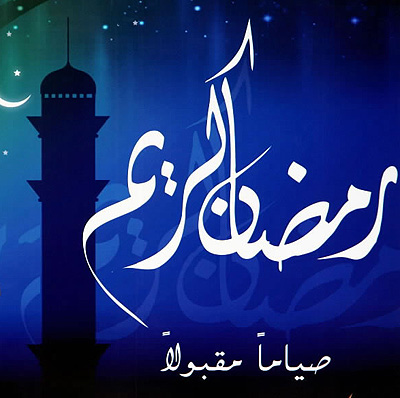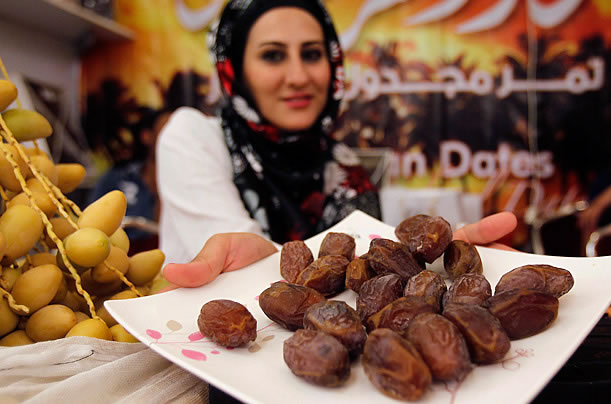
Iftar refers to infringing the daily fast during the Islamic month of Ramadan. It means eating post sunset, especially during the Ramadan festival.
Ramadan begins on the first of the Islamic month. Throughout this month, Muslims begin fasting starting from sunrise till sunset. They make an extra effort to get closer to Allah by donating charity and focusing on the spiritual traditions, for example tarawih (special Ramadan prayers). However, everyone breaks their fast at iftar time before all the evening activities begin,
Iftar happens during the time of the adhan (call to prayer) and occurs at the maghrib (sunset prayer). Traditionally, Muslims will infringe their fasts with some water and dates. Savory foods and sweets often occupy the table, as well. After the maghrib is offered, a full meal is shared among the people. Many people stress the importance of not eating along and sharing Iftar with others.
Muslims believe that sharing Iftar with someone is a form of charity and is thus very rewarding. The Prophet Muhammad also practiced the same. Muslims also believe that feeding someone Iftar in a Masjid Al-Aqsa in Palestine serves as the best reward, as it is considered to be the third most sacred Mosque in Islam.
Verse 183 of the Quran Surah al-Baqarat states that the sole purpose of the fast is to develop a quality called Taqwa in Arabic. A conscience of God always observing you and making a note of the actions you perform in your daily life is born by the person. Not a soul except the person fasting and Allah know whether the person actually observed the entire fast or whether he secretly cheated. Thus, in order to prevent the temptation of cheating, one must bear in mind that God is omnipotent and always watching and will see any lapse.
This fast is mandatory for all those adult Muslims who are sexually mature. The ones who are mentally insane or handicapped are not considered to be adults and thus do not have to undertake the fast. Also, people who are ill do not have to fast if it leads to the further deterioration of their health. However, these should make up for the skipped fasts later, once they become well again.
Pregnant women or those who are nursing are considered to be ill as fasting would prove harmful to their babies. In addition to this, women who are experiencing their menstrual period or who are having post-partum bleeding should abstain from fasting during the days of their bleeding. This is because the effect of both blood loss and fasting could prove harmful to their health.
Children who have not reached puberty yet are not supposed to fast. However, it is good for them to start the practice as soon as possible. This is the primary reason behind many Muslim children starting their fast from the age of seven or nine. A doctor should always be consulted on how much fasting is harmless for a growing child.
People who are traveling regularly may also infringe their fast if they feel the need to do so, i.e., that keeping it would harm them. This includes soldiers who are on guard duty, for whom it is mandatory to be one hundred percent ready at every occasion and thus need to be fit. In all of the above mentioned cases of fear of illness or illness, the skipped days must be made up for later.
The Muslim world has, almost, a staggering variety and diversity of cultures. Each Muslim country may or may not have its own rites and customs associated with the Ramadan festival. Some of the customs which are observed by most of the Muslims are:
The fast is infringed every evening with a meal termed as "Iftar" which means breaking the fast. The last meal is called "suhur", meaning morning meal, which is taken in the morning before dawn. In Muslim countries it is a common practice to have feasts that last all night running from iftar to suhur. These feasts are a time of community and celebration. There also lies a special holiday signifying the end of Ramadan. It is known as Eid al-Fitr.

In India almost everybody halts to rejoice for a couple of minutes on hearing the Iftar sirens and Adan (pronounced azan). In homes and at roadside stalls, the preparations for Iftar begin hours before. The fast can be infringed by consuming dates or drinking water. The latter is done if the former is not available.
People break their fast with Haleem In places like Hyderabad as it has a rich taste and is quite filling.
In states of Southern India such as Tamil Nadu and Kerala, Muslims infringe their fast with Nonbu Kanji. This is a filling and rich rice dish consisting of porridge consistency, which has been cooked for hours with meat and vegetables. This dish is often served along with bonda, bajji, and vadai. Vegetarians of other communities are given a dish prepared from milk known as surkumba. It is mainly prepared in certain parts of Karnataka.
In Northern states of India like Delhi, Madhya Pradesh, Uttar Pradesh and West Bengal, Muslims infringe their fasts with their friends and family. Most Mosques also arrange what is called free Iftar. Typically the fast is opened with fresh dates and neatly cut fresh fruits, which are sometimes served as chaat. In addition there is fruit juice along with fried dishes like pakodas and samosas. The celebration of Iftar can be very grand sometimes with dishes varying from non-vegetarian to vegetarian dishes and a variety of juices locally known as sharbat which is mostly made with Rooh Afza. Iftar is usually a hearty meal and is soon followed by a light dinner before the night known as Isha.